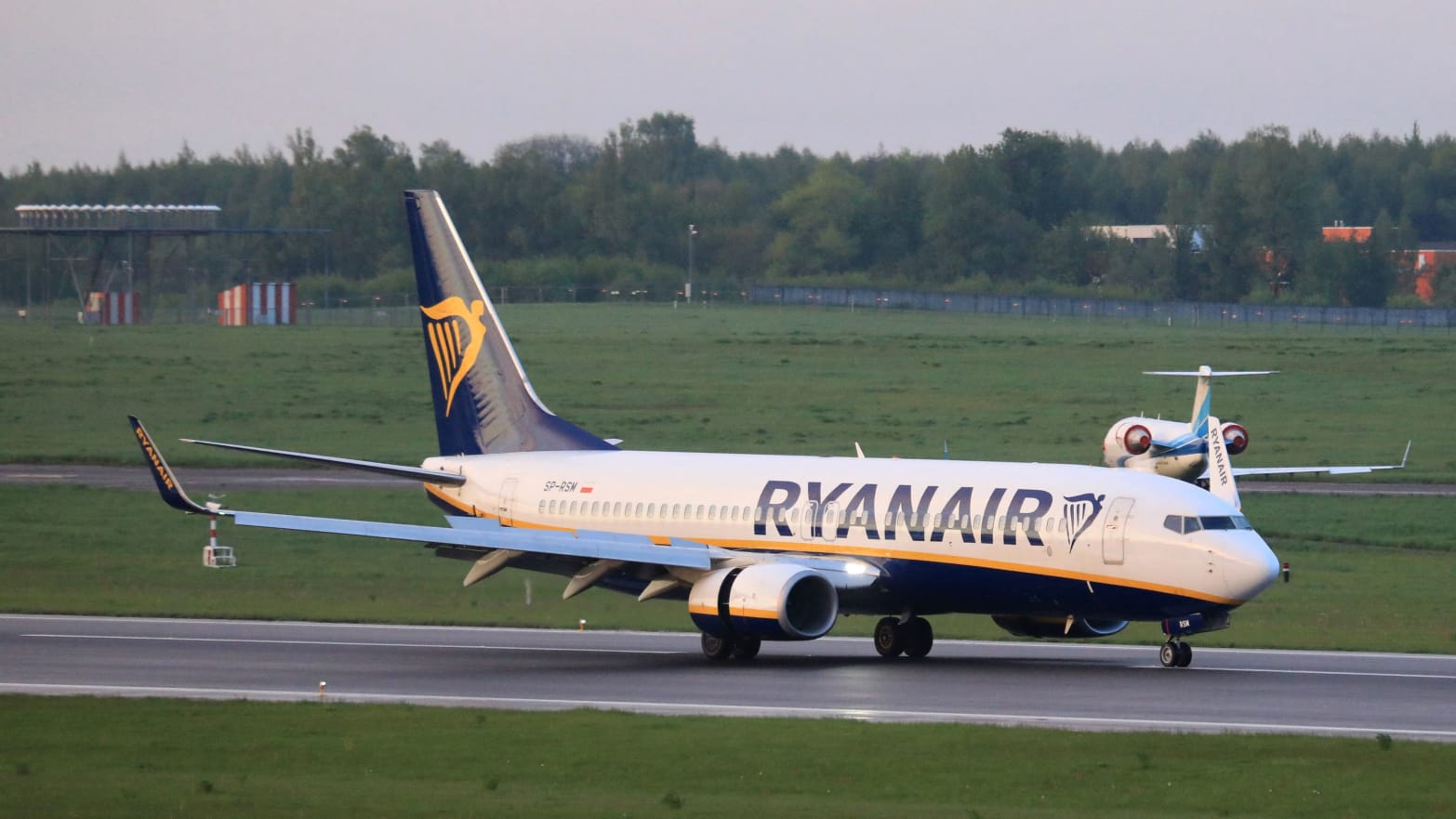As many around the world gasped over the outrage taking place in Belarus—where authorities forced down a passenger jet in order to arrest a journalist—pro-Kremlin propagandists were nothing short of delighted about the incident, rejoicing and celebrating in Moscow.
On Sunday, Belarusian authorities ordered a Ryanair flight that took off from Athens to land in Minsk under false pretenses—a mere pretext to arrest a journalist on board. Roman Protasevich faces the death penalty after being placed on a “terrorist” list for his reporting on police brutality during anti-government protests in Belarus last year.
“Never thought I’d be jealous of Belarus for any reason. But now I’m jealous. Well done, Batka,” tweeted Margarita Simonyan, the head of Russian state-sponsored news outlets RT and Sputnik, using the nickname for Belarusian President Alexander Lukashenko.
Appearing on the state TV show Sunday Evening with Vladimir Soloviev, Simonyan doubled down on her support for the actions of the Belarusian dictator. “That was brazen. Great job. That’s how it ought to be done. I, for one, support such measures.” In response to media inquiries, Simonyan tweeted a poem that seemed to suggest the journalist “had it coming.”
As for the method used to apprehend Protasevich, state TV experts said they’re shocked not by Lukashenko’s tactics—which they described as perfectly normal—but by the reactions from the West.
Speaking on the Russian state TV show 60 Minutes, political scientist Vladimir Kornilov suggested, “Let's dispatch our Snowden to Cuba for a vacation and see what happens then.” Likewise, Russia’s Foreign Ministry spokeswoman Maria Zakharova claimed to be “shocked” not by Lukashenko’s actions, but instead by what she described as “Western hypocrisy” in this regard.
Yury Afonin, a member of the State Duma for the Russian Federation, said on 60 Minutes, “Any traitor to their country—and Protasevich is a traitor and terrorist—will be held accountable. It’s unavoidable.” On another show, political scientist Sergey Mikheyev suggested that Russia could learn a thing or two from the Ryanair incident. “[Lukashenko] created an important precedent for us to follow in dealing with such people.”
RT’s Simonyan was excited that the opposition journalist was captured in such a brazen manner. Perhaps unsurprisingly so, given that she is one of the most vocal proponents of the idea that Russia should ban any media that isn’t owned or controlled by the government.
On the state media talk show The Right to Know in February, Simonyan said, “All resources and instruments that could be used to influence or alter the mentality of the masses and the mood of society need to be owned by us, by our country.” She added: “The West is in a state of war with Russia—a sanction war at the minimum, information war, hybrid war, etcetera. And yet they’re funding everything tied to the opposition. Should we close down everything Western? Yes, I think so.”
To erase any notion of adherence to democratic values, Simonyan clarified: “Why would I see danger in limiting the freedom of speech when I don’t believe in freedom of speech?”
During the state media talk show The Evening with Vladimir Soloviev in March, Simonyan urged, “We must cut anyone who is working for their [Western] money out of Russian political life. Everyone. It has to be forbidden through legislation. Do you want to be in politics or media—and media is the same thing as politics—you can’t do that if you’re receiving even one dollar from over there.” At the same time, Simonyan is adamant that Russian state-funded RT and Sputnik should be able to freely function in Western countries.
Russian President Vladimir Putin isn’t far behind Lukashenko in his quest to silence dissent and eliminate any media coverage that dares to question his authoritarian rule. He falsely claims that Russia’s very survival is in peril, as the West is allegedly scheming to destroy the nation by removing him from his otherwise unending presidency through nefarious means.
The Kremlin’s extensive propaganda apparatus is dedicated to painting the United States as a relentless, omnipresent foe. On state-funded media outlet Sputnik this month, Russian Foreign Ministry Spokeswoman Maria Zakharova asserted that the internet as a whole is secretly controlled by the U.S. government.
“It’s a scary snake pit,” Zakharova exclaimed, describing the world wide web as a tool of hybrid warfare used to interfere in the affairs of sovereign nations. The Russian government’s intent to separate the country’s internet from the rest of the world is being portrayed to average Russians as a set of measures that are being implemented for their own good, as opposed to the real beneficiary: Russian President Vladimir Putin.
The only solution that is being proposed by the Kremlin to the Russian people is the systematic elimination of the internal opposition, along with getting rid of the foreign media operating within Russia’s borders, and the eventual creation of the “sovereign internet,” which would operate separately from the world wide web. The Kremlin’s propagandists are working overtime to convince the citizens that what they really want is less freedom, more oppression, no plurality in media, and no change in power. In other words, a surefire formula to ensure that Putin remains president for life.
On Sunday Evening with Vladimir Soloviev in March, RT’s Simonyan made an Orwellian claim that the Russian people are not suffering from lack of freedom but are instead unhappy with excessive freedoms being afforded by the government—and should be glad to give them up for the good of the country. On The Evening with Vladimir Soloviev last Tuesday, Russian lawmaker Oleg Morozov advocated arresting people left and right, with no regard for what the West might say or do about it. “There is a war of annihilation being waged against my country,” Morozov claimed, as he urged authorities to crack down on the opposition to prevent an uprising.
While opposition leader Alexei Navalny languishes in prison, state media personalities are claiming that the Russians want Putin’s opponents to be crushed in a more violent manner. During his nightly broadcast last Tuesday, state media host Soloviev claimed, “Our liberals are pushing the country back to 1937 [Stalin’s year of terror], which would be welcomed by a sizable segment of the population. It could get very bloody.” This message is meant not only to feed the worst instincts of the public but also to deter any internal opposition, while the external influence is systematically uprooted.
Describing the effect of the Foreign Agent Registration Act (FARA), Simonyan claimed last year that RT’s U.S.-based reporters are being “subjected to horrific pressure from their media, their names are being published, they are being shamed, influence is being exerted upon their friends and their family.” She shamelessly contended, “No normal person could possibly like a monopoly in media. That kind of monopoly leads to fallacies and mistakes. And when the matter at hand pertains to geopolitics and the world order, fallacies and mistakes can be deadly.”
As Roman Protasevich likely faces torture at the hands of Lukashenko's regime, Russian state TV hosts and experts pointed out with cruel glee that he will be forced to provide information about supposedly being funded by Western intelligence agencies, further enforcing the illusion that anyone who dares to question the government is a foreign-funded “traitor.”

